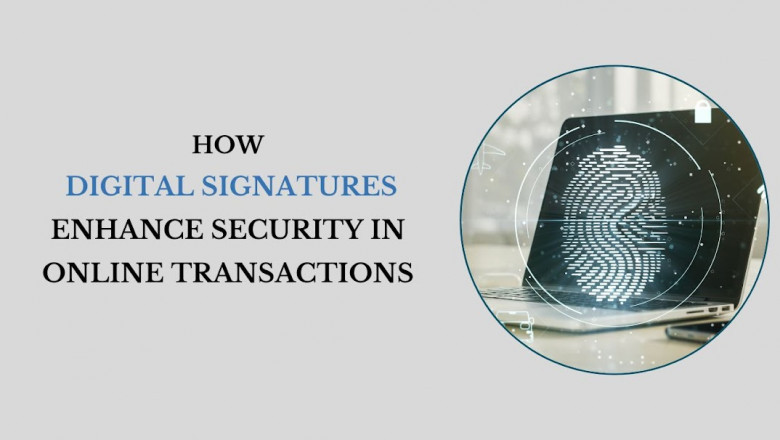views
In today’s digital age, online transactions have become an essential part of our daily lives. From banking and shopping to signing legal documents and filing taxes, people rely on the internet for numerous tasks. However, security threats like fraud, identity theft, and unauthorized access have also increased. One of the most effective ways to ensure security and authenticity in online transactions is through digital signatures. But what are digital signatures, and how do they enhance security? This article will explain digital signatures in simple terms and their role in securing online transactions.
A digital signature is an electronic version of a handwritten signature but is far more secure. It is used to verify the identity of a person or organization and ensure that the information in a document or transaction has not been altered. Digital signatures use cryptographic technology to provide authenticity, integrity, and non-repudiation, making them a crucial tool for secure online communication.
How Digital Signatures Work
Digital signatures rely on a method called public key infrastructure (PKI), which involves two types of keys:
-
Private Key: This key is kept secret and is used to create the digital signature.
-
Public Key: This key is available to anyone and is used to verify the authenticity of the digital signature.
When a person signs a document using a digital signature, their private key generates a unique signature. The recipient can use the sender’s public key to confirm that the signature is valid and that the document has not been altered.
Key Features of Digital Signatures That Enhance Security
-
Authentication: Digital signatures confirm the identity of the sender. Only authorized individuals can sign documents, preventing unauthorized users from pretending to be someone else.
-
Integrity: Once a document is signed digitally, it cannot be changed without invalidating the signature. This ensures that the content remains unchanged during transmission.
-
Non-Repudiation: A digital signature ensures that the sender cannot deny signing the document. Since the private key is unique to the signer, it provides legal proof of the transaction.
-
Encryption and Decryption: Digital signatures often work alongside encryption to ensure that information is securely transmitted and can only be accessed by authorized parties.
Why Digital Signatures are Important for Online Transactions
-
Securing Financial Transactions
-
Online banking, stock trading, and e-commerce rely on digital signatures to verify user identities and protect sensitive information.
-
For example, when you make an online purchase, a digital signature ensures that your payment information is secure and cannot be altered by hackers.
-
Preventing Identity Theft
-
Hackers often try to impersonate individuals or organizations to commit fraud. Digital signatures help prevent identity theft by verifying the authenticity of the sender.
-
Governments and businesses use digital signatures to issue secure documents such as tax returns, contracts, and legal papers.
-
Ensuring Secure Communication
-
Digital signatures are used in emails and messaging systems to ensure that messages are from the intended sender and have not been tampered with.
-
Many email services use digital signatures to authenticate official communications and prevent phishing attacks.
-
Legal Validity and Compliance
-
Many countries recognize digital signatures as legally binding, equivalent to handwritten signatures.
-
Regulations such as eIDAS (Electronic Identification and Trust Services) in the European Union and IT Act in India support the use of digital signatures in electronic transactions.
How Digital Signatures Protect Different Industries
-
E-Commerce
-
Online stores use digital signatures to verify customer payments and secure sensitive payment details.
-
Ensures customers receive genuine products by verifying transactions.
-
Healthcare
-
Doctors and hospitals use digital signatures to secure patient records and medical prescriptions.
-
Ensures that patient information remains confidential and unaltered.
-
Government Services
-
Governments use digital signatures for tax filings, legal documents, and citizen authentication.
-
Helps in reducing paperwork and increasing efficiency.
-
Corporate and Business Transactions
-
Businesses use digital signatures for contracts, agreements, and official communication.
-
Ensures that agreements remain confidential and legally binding.
Common Digital Signature Algorithms
Several cryptographic algorithms are used to create digital signatures. The most popular ones include:
-
RSA (Rivest-Shamir-Adleman): One of the most widely used digital signature algorithms, providing strong encryption.
-
DSA (Digital Signature Algorithm): Used in government applications for digital authentication.
-
ECDSA (Elliptic Curve Digital Signature Algorithm): Offers higher security with smaller key sizes, commonly used in blockchain applications.
Challenges and Limitations of Digital Signatures
Despite their advantages, digital signatures face certain challenges:
-
Need for Trusted Certificate Authorities (CAs): Digital signatures require verification from trusted authorities, which may involve additional costs.
-
Legal Variability: Different countries have different laws regarding the use of digital signatures, which may complicate international transactions.
-
Technology Dependency: Digital signatures require proper software and technical knowledge, which may not be accessible to everyone.
The Future of Digital Signatures
As technology advances, digital signatures will continue to evolve. Future improvements may include:
-
Integration with Blockchain: Blockchain technology provides decentralized and tamper-proof storage of digital signatures.
-
Biometric Digital Signatures: The use of fingerprint or facial recognition to sign digital documents.
-
Artificial Intelligence (AI) Security: AI can help detect fraud and improve the security of digital signatures.
Suggested Read – Class 3 Digital Signature Certificate For eTender
Conclusion
Digital signatures play a crucial role in enhancing the security of online transactions. They provide authentication, integrity, and non-repudiation, ensuring that digital communications and transactions remain secure and legally valid. With increasing cyber threats, digital signatures are a necessary tool for businesses, governments, and individuals to protect sensitive information. As technology continues to evolve, digital signatures will become even more secure and widely adopted in various industries.
By implementing digital signatures in everyday online transactions, we can create a safer and more trustworthy digital world.














Comments
0 comment